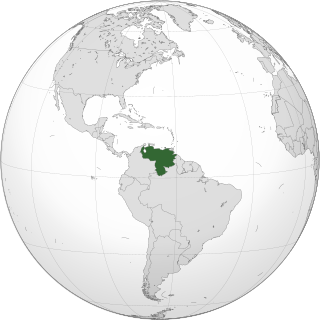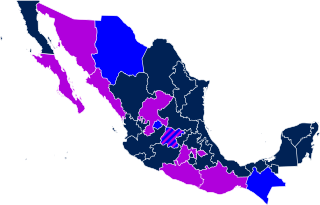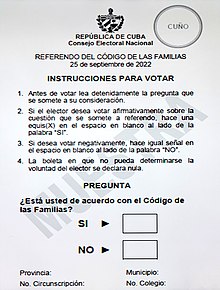Same-sex adoption is the adoption of children by same-sex couples. It may take the form of a joint adoption by the couple, or of the adoption by one partner of the other's biological child.

Lesbian, gay, bisexual, and transgender (LGBT) people in Venezuela face legal challenges not experienced by non-LGBT residents. Both male and female types of same-sex sexual activity are legal in Venezuela, but same-sex couples and households headed by same-sex couples are not eligible for the same legal protections available to opposite-sex married couples. Also, same-sex marriage and de facto unions are constitutionally banned since 1999.
This article contains a timeline of significant events regarding same-sex marriage and legal recognition of same-sex couples worldwide. It begins with the history of same-sex unions during ancient times, which consisted of unions ranging from informal and temporary relationships to highly ritualized unions, and continues to modern-day state-recognized same-sex marriage. Events concerning same-sex marriages becoming legal in a country or in a country's state are listed in bold.

Lesbian, gay, bisexual, and transgender (LGBT) rights in Cuba have significantly varied throughout modern history. Cuba is now considered generally progressive, with vast improvements in the 21st century for such rights. Following the 2022 Cuban Family Code referendum, there is legal recognition of the right to marriage, unions between people of the same sex, same-sex adoption and non-commercial surrogacy as part of one of the most progressive Family Codes in Latin America. Until the 1990s, the LGBT community was marginalized on the basis of heteronormativity, traditional gender roles, politics and strict criteria for moralism. It was not until the 21st century that the attitudes and acceptance towards LGBT people changed to be more tolerant.

Lesbian, gay, bisexual, and transgender (LGBT) rights in Mexico expanded in the 21st century, keeping with worldwide legal trends. The intellectual influence of the French Revolution and the brief French occupation of Mexico (1862–67) resulted in the adoption of the Napoleonic Code, which decriminalized same-sex sexual acts in 1871. Laws against public immorality or indecency, however, have been used to prosecute persons who engage in them.

Same-sex marriage is legally recognized and performed throughout Mexico since 31 December 2022. On 10 August 2010 the Supreme Court of Justice of the Nation ruled that same-sex marriages performed anywhere within Mexico must be recognized by the 31 states without exception, and fundamental spousal rights except for adoption have also applied to same-sex couples across the country. Mexico was the fifth country in North America and the 33rd worldwide to allow same-sex couples to marry nationwide.

Lesbian, gay, bisexual, and transgender (LGBT) people in Panama face legal challenges not experienced by non-LGBT residents. Same-sex sexual activity is legal in Panama, but same-sex couples and households headed by same-sex couples are not eligible for the same legal benefits and protections available to opposite-sex married couples.
Several countries in the Americas grant legal recognition to same-sex unions, with almost 85 percent of people in both North America and South America living in jurisdictions providing marriage rights to same-sex couples.
Same-sex marriage has been legal in Ecuador since 8 July 2019 in accordance with a Constitutional Court ruling issued on 12 June 2019 that the ban on same-sex marriage was unconstitutional under the Constitution of Ecuador. The ruling took effect upon publication in the government gazette on 8 July. Ecuador became the fifth country in South America to allow same-sex couples to marry, after Argentina, Brazil, Uruguay and Colombia, but adoption by married couples remains restricted to opposite-sex couples. The country has also recognized same-sex civil unions since 2008.
Same-sex marriage has been legal in Cuba since 27 September 2022 after a majority of voters approved the legalization of same-sex marriage in a referendum two days prior. The Constitution of Cuba prohibited same-sex marriage until 2019, and in May 2019 the government announced plans to legalize same-sex marriage. A draft family code containing provisions allowing same-sex couples to marry and adopt was approved by the National Assembly of People's Power on 21 December 2021. The text was under public consultation until 6 June 2022, and was approved by the Assembly on 22 July 2022. The measure was approved by two-thirds of voters in a referendum held on 25 September 2022. President Miguel Díaz-Canel signed the new family code into law on 26 September, and it took effect upon publication in the Official Gazette the following day.
Venezuela does not recognize same-sex unions. In 2008, the Supreme Tribunal of Justice ruled that the Constitution of Venezuela neither prohibits nor requires the recognition of same-sex marriage. In January 2015, a lawsuit seeking to legalise same-sex marriage in Venezuela was filed with the Supreme Tribunal, which announced in April 2016 that it would hear the case, though no decision has been made as of August 2023. On 24 February 2022, a deputy of the opposition Cambiemos Movimiento Ciudadano party introduced a same-sex marriage bill to the National Assembly.

Same-sex marriage is legal in the following countries: Andorra, Argentina, Australia, Austria, Belgium, Brazil, Canada, Chile, Colombia, Costa Rica, Cuba, Denmark, Ecuador, Estonia, Finland, France, Germany, Greece, Iceland, Ireland, Luxembourg, Malta, Mexico, the Netherlands, New Zealand, Norway, Portugal, Slovenia, South Africa, Spain, Sweden, Switzerland, Taiwan, the United Kingdom, the United States, and Uruguay.
El Salvador does not recognize same-sex marriage, civil unions or any other legal union for same-sex couples. A proposal to constitutionally ban same-sex marriage and adoption by same-sex couples was rejected twice in 2006, and once again in April 2009 after the Farabundo Martí National Liberation Front (FMLN) refused to grant the measure the four votes it needed to be ratified.
Same-sex unions are currently not recognized in Honduras. Since 2005, the Constitution of Honduras has explicitly banned same-sex marriage. In January 2022, the Supreme Court dismissed a challenge to this ban, but a request for the Inter-American Commission on Human Rights to review whether the ban violates the American Convention on Human Rights is pending. A same-sex marriage bill was introduced to Congress in May 2022.

A constitutional referendum was held in Cuba on 24 February 2019. Voters were asked whether they approved of a new constitution passed by the National Assembly of People's Power in July 2018. The reforms were approved, with 90.61% of valid votes cast in favour. The new constitution came into force on 10 April 2019 after it was proclaimed in the Cuban National Assembly and published in the Official Gazette of the Republic.
Same-sex marriage has been legal in Hidalgo since 11 June 2019. A bill for the legalization of same-sex marriages in Hidalgo was approved by the state Congress on 14 May 2019. It was published in the official state journal on 10 June and took effect the following day.
Same-sex marriage has been legal in Sinaloa since 30 June 2021. On 12 June 2021, a federal court ordered the Congress of Sinaloa to pass a same-sex marriage law by 15 June, in accordance with jurisprudence established by the Supreme Court of Justice of the Nation. Subsequently, same-sex marriage legislation passed Congress unanimously on 15 June. It was published in the official state journal on 29 June, and entered into force the following day, making Sinaloa the 20th Mexican state to legalize same-sex marriage.
Same-sex marriage has been legal in Yucatán since 4 March 2022. On 25 August 2021, the Congress of Yucatán removed a constitutional ban on same-sex marriages. The new law entered into force on 7 September 2021. Congress had 180 days to change statutory law to accommodate same-sex marriage, and did so unanimously on 1 March. The law took effect three days later, and made Yucatán the 25th Mexican state to legalize same-sex marriage.
The recognition of same-sex unions varies by country.
Same-sex marriage has been legal in Tabasco since 27 October 2022. A bill to legalise same-sex marriage was passed by the Congress of Tabasco on 19 October 2022. It was signed by Governor Carlos Manuel Merino Campos, and published in the official state journal on 26 October, taking effect the next day. Tabasco was the fourth-to-last state in Mexico to legalize same-sex marriage.










